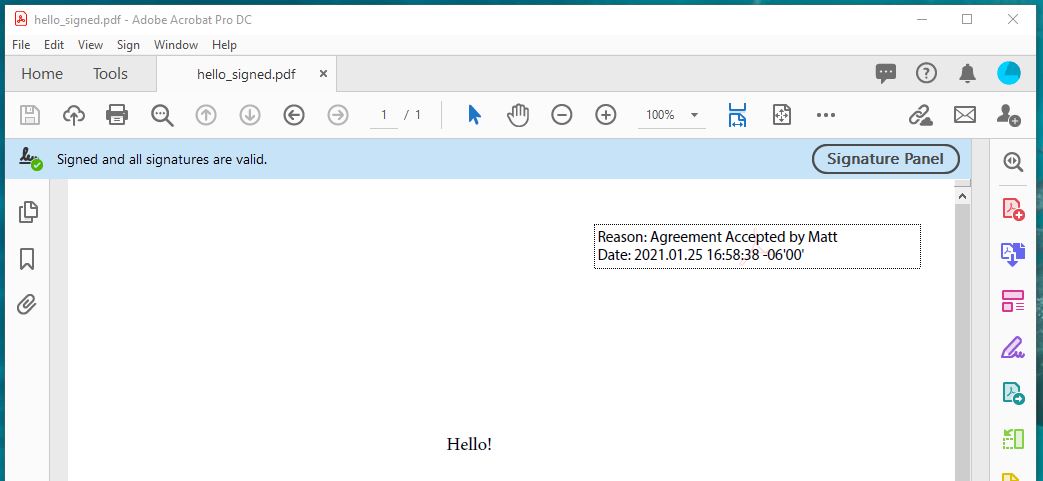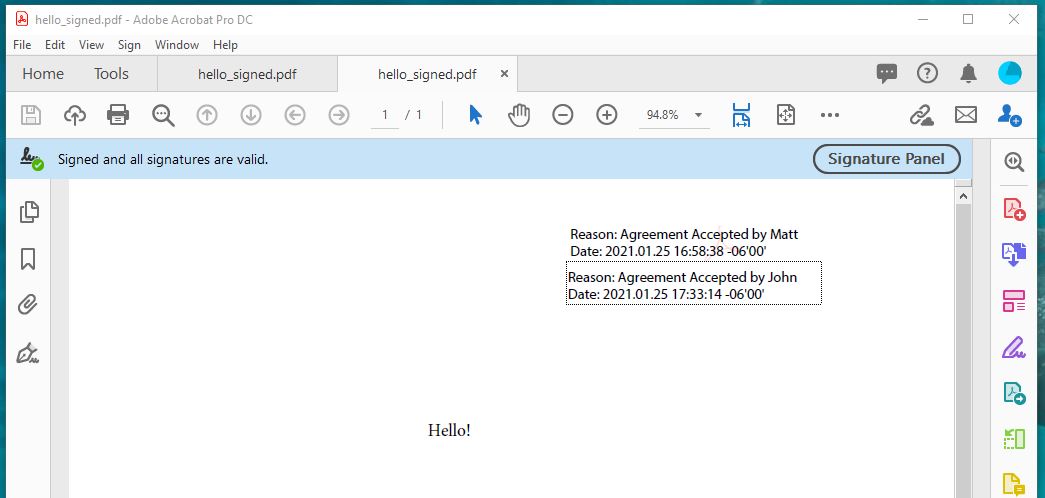|
|
(Unicode C) PDF Sign Under Existing Signature
This example explains how sign a previously-signed PDF and place the signature appearance below the existing signature.
Note: This example requires Chilkat v9.5.0.85 or greater.
#include <C_CkPdfW.h>
#include <C_CkJsonObjectW.h>
#include <C_CkCertW.h>
void ChilkatSample(void)
{
HCkPdfW pdf;
BOOL success;
HCkJsonObjectW json;
HCkCertW cert;
// This example requires the Chilkat API to have been previously unlocked.
// See Global Unlock Sample for sample code.
pdf = CkPdfW_Create();
// Load a PDF to be signed.
success = CkPdfW_LoadFile(pdf,L"qa_data/pdf/sign_testing_4/hello_signed.pdf");
if (success == FALSE) {
wprintf(L"%s\n",CkPdfW_lastErrorText(pdf));
CkPdfW_Dispose(pdf);
return;
}
// The PDF we'll be signing already has a signature added in Adobe Acrobat DC.
// It looks like this:
// (Notice the Adobe background logo, which is commonly what you'll see when a signature
// is created by Adobe Acrobat. Chilkat (obviously) does not create signatures using the Adobe
// logo because it would be a copyright violation.)
 // Options for signing are specified in JSON.
json = CkJsonObjectW_Create();
// In most cases, the signingCertificateV2 and signingTime attributes are required.
CkJsonObjectW_UpdateInt(json,L"signingCertificateV2",1);
CkJsonObjectW_UpdateInt(json,L"signingTime",1);
// To put our new signature underneath the existing signature, we have to specify the page
// where the existing signature is found, and then we can specify "under" for the "appearance.y"
CkJsonObjectW_UpdateInt(json,L"page",1);
CkJsonObjectW_UpdateString(json,L"appearance.y",L"under");
CkJsonObjectW_UpdateString(json,L"appearance.fontScale",L"10.0");
CkJsonObjectW_UpdateString(json,L"appearance.text[0]",L"Reason: Agreement Accepted by John");
CkJsonObjectW_UpdateString(json,L"appearance.text[1]",L"Date: current_dt");
// Load the signing certificate. (Use your own certificate.)
cert = CkCertW_Create();
success = CkCertW_LoadPfxFile(cert,L"qa_data/pfx/myPdfSigningCert.pfx",L"secret");
if (success == FALSE) {
wprintf(L"%s\n",CkCertW_lastErrorText(cert));
CkPdfW_Dispose(pdf);
CkJsonObjectW_Dispose(json);
CkCertW_Dispose(cert);
return;
}
// Tell the pdf object to use the certificate for signing.
success = CkPdfW_SetSigningCert(pdf,cert);
if (success == FALSE) {
wprintf(L"%s\n",CkPdfW_lastErrorText(pdf));
CkPdfW_Dispose(pdf);
CkJsonObjectW_Dispose(json);
CkCertW_Dispose(cert);
return;
}
// Note: When adding an additional signature to a PDF, the existing signatures
// are validated, and this includes validating the certificates previously used to
// create the existing signatures. (A signature typically embeds the signing certs.)
// In some cases, the certificates and/or certs in the chain of authentication for
// existing signatures are not present, and are not available on the current system.
// In this case, you can skip the validation by setting this keyword in UncommonOptions:
CkPdfW_putUncommonOptions(pdf,L"NO_VERIFY_CERT_SIGNATURES");
success = CkPdfW_SignPdf(pdf,json,L"qa_output/hello_signed.pdf");
if (success == FALSE) {
wprintf(L"%s\n",CkPdfW_lastErrorText(pdf));
CkPdfW_Dispose(pdf);
CkJsonObjectW_Dispose(json);
CkCertW_Dispose(cert);
return;
}
wprintf(L"The PDF has been successfully cryptographically signed.\n");
// Here's a screenshot of the 2nd signature positioned under the 1st in Adobe Acrobat:
// Options for signing are specified in JSON.
json = CkJsonObjectW_Create();
// In most cases, the signingCertificateV2 and signingTime attributes are required.
CkJsonObjectW_UpdateInt(json,L"signingCertificateV2",1);
CkJsonObjectW_UpdateInt(json,L"signingTime",1);
// To put our new signature underneath the existing signature, we have to specify the page
// where the existing signature is found, and then we can specify "under" for the "appearance.y"
CkJsonObjectW_UpdateInt(json,L"page",1);
CkJsonObjectW_UpdateString(json,L"appearance.y",L"under");
CkJsonObjectW_UpdateString(json,L"appearance.fontScale",L"10.0");
CkJsonObjectW_UpdateString(json,L"appearance.text[0]",L"Reason: Agreement Accepted by John");
CkJsonObjectW_UpdateString(json,L"appearance.text[1]",L"Date: current_dt");
// Load the signing certificate. (Use your own certificate.)
cert = CkCertW_Create();
success = CkCertW_LoadPfxFile(cert,L"qa_data/pfx/myPdfSigningCert.pfx",L"secret");
if (success == FALSE) {
wprintf(L"%s\n",CkCertW_lastErrorText(cert));
CkPdfW_Dispose(pdf);
CkJsonObjectW_Dispose(json);
CkCertW_Dispose(cert);
return;
}
// Tell the pdf object to use the certificate for signing.
success = CkPdfW_SetSigningCert(pdf,cert);
if (success == FALSE) {
wprintf(L"%s\n",CkPdfW_lastErrorText(pdf));
CkPdfW_Dispose(pdf);
CkJsonObjectW_Dispose(json);
CkCertW_Dispose(cert);
return;
}
// Note: When adding an additional signature to a PDF, the existing signatures
// are validated, and this includes validating the certificates previously used to
// create the existing signatures. (A signature typically embeds the signing certs.)
// In some cases, the certificates and/or certs in the chain of authentication for
// existing signatures are not present, and are not available on the current system.
// In this case, you can skip the validation by setting this keyword in UncommonOptions:
CkPdfW_putUncommonOptions(pdf,L"NO_VERIFY_CERT_SIGNATURES");
success = CkPdfW_SignPdf(pdf,json,L"qa_output/hello_signed.pdf");
if (success == FALSE) {
wprintf(L"%s\n",CkPdfW_lastErrorText(pdf));
CkPdfW_Dispose(pdf);
CkJsonObjectW_Dispose(json);
CkCertW_Dispose(cert);
return;
}
wprintf(L"The PDF has been successfully cryptographically signed.\n");
// Here's a screenshot of the 2nd signature positioned under the 1st in Adobe Acrobat:
 CkPdfW_Dispose(pdf);
CkJsonObjectW_Dispose(json);
CkCertW_Dispose(cert);
}
CkPdfW_Dispose(pdf);
CkJsonObjectW_Dispose(json);
CkCertW_Dispose(cert);
}
|

